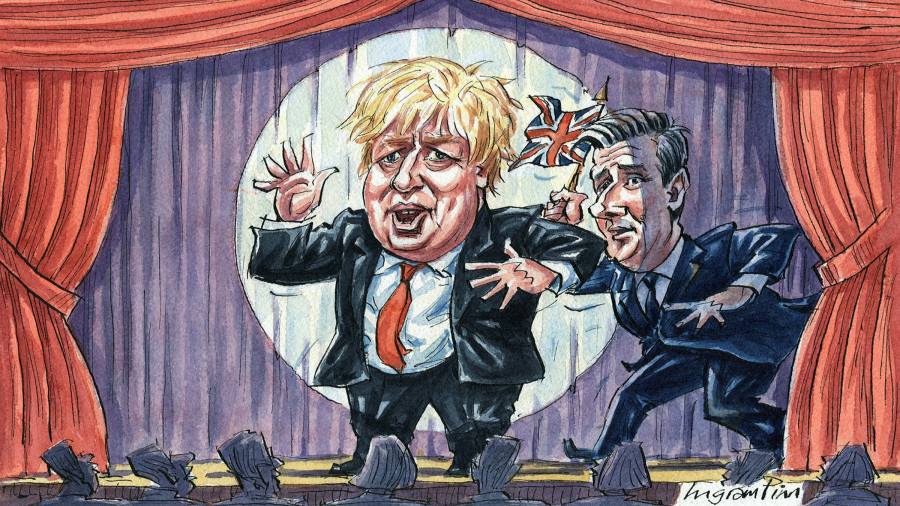[ad_1]
In a land that sacks its football managers after only a handful of defeats, it should not be surprising that patience with political leaders is similarly limited. A recent loss of form has even supporters of Sir Keir Starmer questioning his leadership of the UK’s Labour party.
The language of sport punditry even permeates the criticism. He’s not punishing their mistakes. The star players aren’t performing. There’s no penetration up front, Gary.
The two proximate causes for all this are some mediocre opinion polls and a leaked strategy document suggesting that Labour make more use of the Union Jack. For all the predictable mockery from the left, appearing to like your country is a precondition of electoral victory. But, added to Starmer’s decision to park the Brexit fight, it has left even his allies wondering if he is more tactics than substance.
Still more important is Labour’s frustration that voters have not turned on Boris Johnson during the pandemic. Labour supporters rage that the prime minister “is going to get away with itâ€. But reflex hatred of Johnson blinds them to the larger political challenge.
Much of the pain is the reality of opposition. One year on from a crushing electoral defeat, voters are not overly interested in Labour. Despite some recent missteps, Starmer has rammed home the one thing he needs voters to know — that Labour is under new leadership. His poll ratings have dipped in recent weeks, as the government enjoys a vaccine bump. But they are still up nine percentage points since he took over. The next weeks will see a bit more energy and headline policies, such as scrapping universal credit. But this is largely for internal consumption.
Underlying all the nerves is the more fundamental problem that the Conservatives have taken Labour’s story. “Build Back Better†should be a Labour slogan, but Johnson has nabbed it with promises of a more active state, investment in left-behind towns and regions, a green recovery and more funding for public services. At some point, Labour may be able to argue this was empty rhetoric. But not yet. Starmer’s problem is not that he wants to wrap himself in the flag; it is that the Tories have run off with any alternative apparel.
Meanwhile, the Tories have become better at talking to those voters he needs to reclaim. One ally says: “Tony Blair persuaded lots of people who were not natural Labour voters that he personally liked their values and the way they lived — church, family, football, discipline, ambition for your children. That’s actually because he did.†Voters do not yet see the same in Starmer.
Nearly two decades of Conservative rule gave Blair a lot of material to work with. Yet he also redrew political dividing lines, successfully telling aspirational Tory voters that the Conservatives “have let you down . . . Labour is on your sideâ€. With the so-called red-wall industrial seats, Johnson pulled the same trick in reverse. When you lose voters in such a seismic way, you cannot quickly reclaim them.Â
(The job is harder still given the culture-war issues that Johnson hopes will drive a wedge between the instincts of Labour members and socially conservative working-class voters.)
Some Labour figures, like Lisa Nandy, grasped these threats in the small towns, but too many colleagues saw votes in the traditional Labour offerings of jobs and welfare. Under Jeremy Corbyn’s leadership, those voters instead saw condescension and mismatched values. The Tories, and Brexiters especially, spoke more intuitively to local pride and self-identity.
As one Starmer backer puts it, families in single-industry towns have identities tied up with marks of status beyond their work. “Give a man a job in an industrial estate 20 miles away and he’s working with people he doesn’t know, whose children don’t go to school with his and nobody recognises his worth as a person. If he and his wife are older, they won’t be able to walk round the corner to see their grandchildren because their sons and daughters have moved to cities.â€
Shorn of a compellingly different economic vision, Labour’s hope is that Johnson’s pledges can be shown to be hollow. The prime minister may have skilfully drawn a line between himself and the austerity years, closing off fertile lines of attack. But the economic crisis means Tories are eventually going to have to make choices between spending cuts and tax rises. Brexit may bite hard and levelling-up is still less a coherent strategy than a slogan.
Labour does not control its destiny, which is why small setbacks gain a disproportionate focus. After a decade of austerity conservatism, the two parties’ broad economic strategies have converged and Labour is fighting for ownership of a similar vision. Labour’s one advantage is that it believes in it with more conviction.
This is an attritional fight and Johnson will not surrender territory easily. Labour must grasp the scale of the electoral shift, which may take more than a term to undo. Only severe economic hardship offers a quick route back.
No doubt Starmer can sharpen up, but it would be a mistake to see salvation in a further tilt left or in anything other than contesting the new economic and social centre-ground. There is no quick fix, no change of manager to raise Labour up the polls. Patience is a virtue you have to learn when you gift your story to the other side.Â
[ad_2]
Source link





